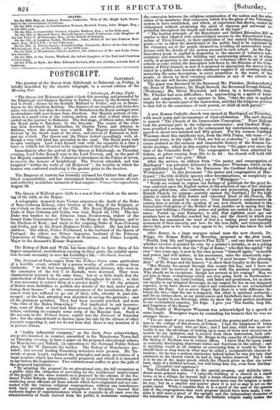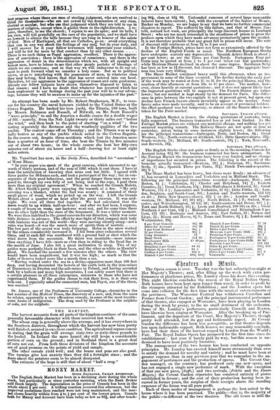• A new Roman Catholic church was opened at Hartlepool
on Thursday, with much pomp and circumstance of local celebration. The new church is named " The Church of the Immaculate Conception." Four Bishops took the principal part in the religious ceremonies ; and Cardinal Wise- man preached a sermon, and in the subsequent lay entertainments made a speech to about two hundred and fifty guests. For his sermon Cardinal Wiseman chose this significant text, from the 89th Psalm, 4th verse—" A thousand years, in thy sight, 0 God, are but as yesterday" ; and his dis- course insisted on the oneness and immutable history of the Roman Ca- tholic doctrine, which in this country has been "the,aame ever since the time of the Venerable Bede." The congregation hid lieen admitted by tickets, at prices varying from 20s. to 2s. 6d. : the church will hold 500 persons, and was "not quite " filled.
After the service, an address from "the pastor and congregation of Hartlepool " was privately delivered to Monsignor Wiseman which in the copy published is headed " to his Eminence the Cardinal Archbishop of Westminster." In this document " the pastor and congregation of Har- tlepool," [the title skilfully ignores other denttrainations, as completely as if a territorial title had been used,] say to " MeAsignor "— " Words are wanted to express our feelings of gratitude for the great fa- your conferred upon the English nation in the selection of one of her choicest and most gifted sons, after centuries of trial and persecution, [against the Romish Church, we suppose—scarcely against the Cardinal, for the high dignity to which the Holy Father and venerated Head of the Church, FM Nono, has been pleased to raise you. Your Eminence's condescension he coming here to preside at the opening of our new church, dedicated to tha, Immaculate Conception of the Mother of God, justifies us in saying that the virtues best befitting a Christian prince and prelate are united in your Emi- nence. Permit us, your Eminence, to add, that eighteen years ago our numbers here as Catholics reached but ten iand the church in which you have this day announced the word of God is a lasting proof and standing monument of their sincerity and love for the true faith, and triumphantly shows that, poor as the term may appear to be, religion has taken the lead therein."
After dinner, in a large marquee raised near the new church, Dr. Briggs, the iota= Bishop of Beverley, proposed as the first toast, "Health, long life, and happiness to Pius XIX_ ' ; and one does not know whether nineteen is printed for nine by a printer's mistake, or as a jolting threat to the Standard, that the "Pope of Rome," who fled the capitol for ever" two years ago, is now in his own person "himself again," in health and power, and will endure, in his successors, unto the nineteenth repe- tition. " 'This toast having been drunk," it next became "the pleasing duty" of Dr. Briggs and his hearers "to show their loyalty to the Queen." "Her Majesty has passed through this county this day, and I have nos doubt she will be received in her progress with the greatest enthusiasm. Why should we be exceptions, though not present at her coming ? May we not join in those acclamations which are now going forth in Northumber-
? Therefore, my Lord Cardinal, and ladies and gentlemen, let us show our loyalty to our temporal Sovereign, in our respect for her as our temporal superior, as we have shown our respect and veneration to our ecclesiastical superior, the Pope. Let us never forget that there is a wide difference be- tween the two,—that the one is temporal, the other is spiritual authority ; and let us always show, as our predecessors and forefathers have shown, the greatest loyalty to our Sovereign, while we show the most perfect obedience to our ecclesiastical superior, the Pope. I give you The health, long life, and happiness of the Queen.' "
The health of Monsignor Wiseman was acknowledged by a speech of some length. Monsignor began by reminding his hearers that he was no ger there— "You are most of you aware that I received the greater part of my educa- tion in the college of this diocese, at 17shaw. I had the happiness of being the companion of many who are here ; and I had also, what was more va- luable to me, the advantage of looking up to some of those now around me as models for my imitation, and to receive from them instruction, both reli- gious and clerical. I remember Dr. Briggs in the capacity of a philosopher ; the Bishop of Hexham was in various offices. I knew him for many years as zealously discharging important duties and functions in the college ; and if anything would at all surprise us concerning him, it would be that he should have so long been in what may be called a comparatively obscure si- tuation ; for he was a zealous missionary indeed before he was put into that eminence in the church which he had so long before deserved. But I take it to be one of the many proofs which the Church gives us that she never loses sight of a faithful servant, but will bring him out, even from Darling.; to I, applause.) The Cardinal then referred to the special occasion, and skilfully intro- duced more general topics. "I value the building of a church in a small town, or in a village, far beyond half a dozen churches in great cities ; be- cause where there are large masses it is much more easy for religion to make its way, but in a smaller and quieter place it is not so easy to act on the public mind. While I consider that it is a proof of the zeal of the pastors and of the congregations that such progress should have been made, I con- sider it still more a proof of the upright and the independent character of the inhabitants of this place, that the Catholic religion really makes the
best progress where there are men of sterling judgment, who are resolved to think for themselves—who are not cowed by the domination of any class, clerical or secular, but who use that judgment which they are told to use in matters of religion, except when it guides them in the right direction. I re- joice, therefore, to see the church; I rejoice to see its spire; and its bells, I am sure, will toll gratefully on the ears of the population, and we shall have no lawsuit to silence the bells because they are rung in honour of the saints of God. Men of Hartlepool, all that are Catholics, go on : avoid everything that can in any way shock the feelings of any one but do your duty, and I will answer for it your fellow townsmen will appreciate your conduct, and will be led far more by that conduct than by any other means There is no such thing as Papal aggression, recollect. There is the aggres- sion of conviction ; there is the aggression of conscience ; and there is the aggression of desire in the determination which we, with all upright and honest men, have to labour to see that other people partake of blessings of which we are conscious ; and in that way we will endeavour to do our ut- most to push forward what we consider a holy cause. But as to political views, or as to interfering with the possessions of men, to whatever class they may belong, God knows that that has never entered into our head. Therefore, let our aggression be the aggression of reason and calm good sense. Already oar fellow subjects have shown themselves disposed to listen to that reason ; and I have no doubt that whatever has occurred which has been unpleasant to our feelings during the past year will be to our advan- tage, because they will be anxious to make up for the injustice of the past."



























 Previous page
Previous page